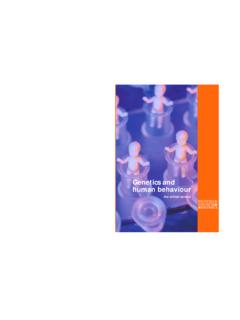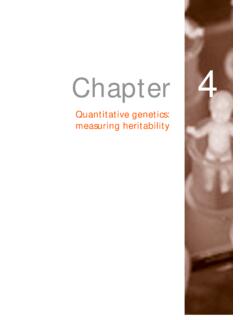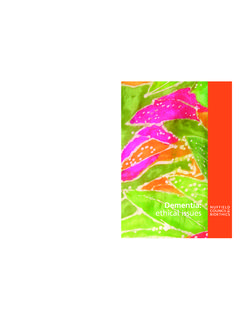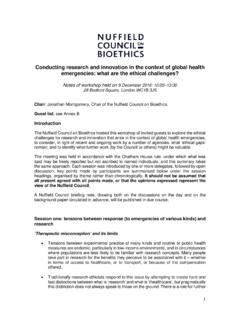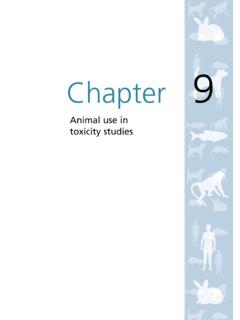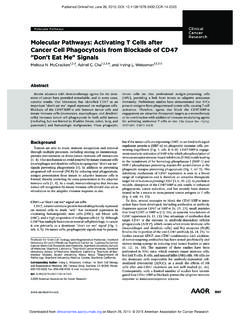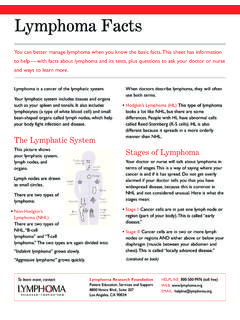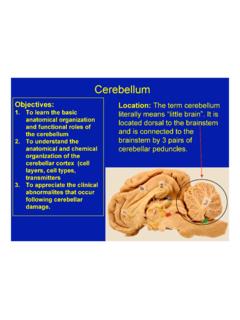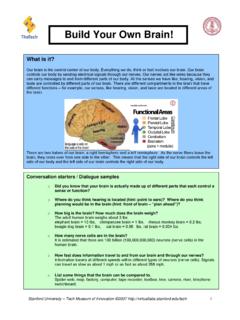Transcription of Stem Cell Therapy: the ethical issues - Nuffield Bioethics
1 stem Cell therapy : the ethical issues a discussion paper Published by Nuffield Council on Bioethics 28 Bedford Square London WC1B 3EG. Telephone: 020 7681 9619. Fax: 020 7637 1712. Email: Website: April 2000. Nuffield Council on Bioethics 2000. All rights reserved. Apart from fair dealing for the purpose of private study, research, criticism or review, no part of the publication may be produced, stored in a retrieval system or transmitted in any form, or by any means, without prior permission of the copyright owners.
2 Nuffield Council on Bioethics Professor Ian Kennedy (Chairman). Professor Martin Bobrow CBE (Deputy Chairman). Professor Tom Baldwin Professor Sir Kenneth Calman KCB FRSE*. Reverend Professor Duncan Forrester DD. Professor Brian Heap CBE FRS. Mrs Rebecca Howard Lady Hornby Professor John Ledingham Mr Derek Osborn CB. Professor Catherine Peckham CBE. Professor Martin Raff FRS. Mr Nick Ross Professor Herbert Sewell Professor Albert Weale FBA. * (co-opted member of Council for the period of his Chairmanship of the Working Party on the ethics of healthcare-related research in developing countries).
3 The terms of reference are as follows: 1 to identify and define ethical questions raised by recent advances in biological and medical research in order to respond to, and to anticipate, public concern;. 2 to make arrangements for examining and reporting on such questions with a view to promoting public understanding and discussion; this may lead, where needed, to the formulation of new guidelines by the appropriate regulatory or other body;. 3 in the light of the outcome of its work, to publish reports; and to make representations, as the Council may judge appropriate.
4 The Nuffield Council on Bioethics is funded jointly by the Medical Research Council, the Nuffield Foundation and the Wellcome Trust Attendees of the Round Table meeting on stem Cell therapy : the ethical issues Professor Martin Bobrow CBE, Department of Medical Genetics, Cambridge Institute for Medical Research and Deputy Chairman of Nuffield Council on Bioethics Professor Tom Baldwin, Department of Philosophy, University of York, member of Nuffield Council on Bioethics Lady Hornby, Chairman of The Kingwood Trust, member of Nuffield Council on Bioethics Professor Alexander McCall-Smith, Faculty of Law, University of Edinburgh Dr Anne McLaren DBE FRS, Wellcome/CRC Institute Cambridge.
5 Member of the Nuffield Council on Bioethics Secretariat Dr Sandy Thomas (Director). Ms Susan Bull Ms Julia Fox Ms Yvonne Melia Acknowledgements The Council wishes to thank the attendees of the Round Table meeting for their assistance in the preparation of this paper. Their expertise has been invaluable. The Council is also very grateful to Professor Alastair Campbell and the Reverend Dr John Polkinghorne, who reviewed an early version of the paper. stem Cell therapy : the ethical issues Executive Summary The ability to culture human stem cells long term, and possibly indefinitely, and to control how such cells specialise to form the different tissues of the body offers the possibility of major advances in healthcare.
6 stem cells have been isolated and cultured, but a great deal of research is required to develop cell lines which can generate replacement cells and tissues to treat many diseases. The use of human pluripotent stem cells is controversial primarily because much of the current research is focused on deriving these cells from human embryos and cadaveric fetal tissue. We have examined the ethical issues raised by the potential of stem cells derived from donated embryos, embryos created specifically for research purposes, cadaveric fetal tissue and somatic cell nuclear transfer (SCNT).
7 We conclude that the removal and cultivation of cells from a donated embryo does not indicate lack of respect for the embryo. We take the view that there are no grounds for making a moral distinction between research into diagnostic methods or reproduction which is permitted under UK legislation and research into potential therapies which is not permitted. We therefore recommend that research involving human embryos be permitted for the purpose of developing tissues to treat diseases from derived embryonic stem (ES) cells and that Schedule 2 of the Human Fertilisation and Embryology Act be amended accordingly.
8 As long as there are sufficient and appropriate donated embryos from IVF. treatments for use in research, the Council takes the view that there are no compelling reasons to allow additional embryos to be created merely to increase the number of embryos available for ES cell research or therapy . However, we suggest that this issue be kept under review. We conclude that the code of practice set out in the Polkinghorne Review provides an adequate framework for the use of fetal tissue in the derivation of embryonic germ (EG) cells .
9 We suggest, however, that the question of consent for the use of donated fetal tissue for the purpose of deriving EG stem cells be re-considered in the context of the current guidance and regulation. While we recommend that research be permitted, we also recommend that as a safeguard to protect all embryo donors who could theoretically be identified by analysis of DNA of an ES. cell line, they be specifically asked to consent to this research and any subsequent use of the cell line. We consider that research into SCNT and other forms of reprogramming the nuclei of human somatic cells may potentially offer very significant medical benefits.
10 Where such research falls within the remit of the HFE. Act, adoption of the amendment to Schedule 2 recommended above would permit such research to be licensed. We understand that a possible objection to this is that it could prepare the ground for reproductive cloning. However, reproductive cloning (which has the intention of 1. stem Cell therapy : the ethical issues producing a new individual who is genetically identical to the nuclear donor) is not permissible under UK law; the purpose of this proposed use of SCNT, by contrast, is to allow research into means of producing stem cells for cell and tissue therapy .
